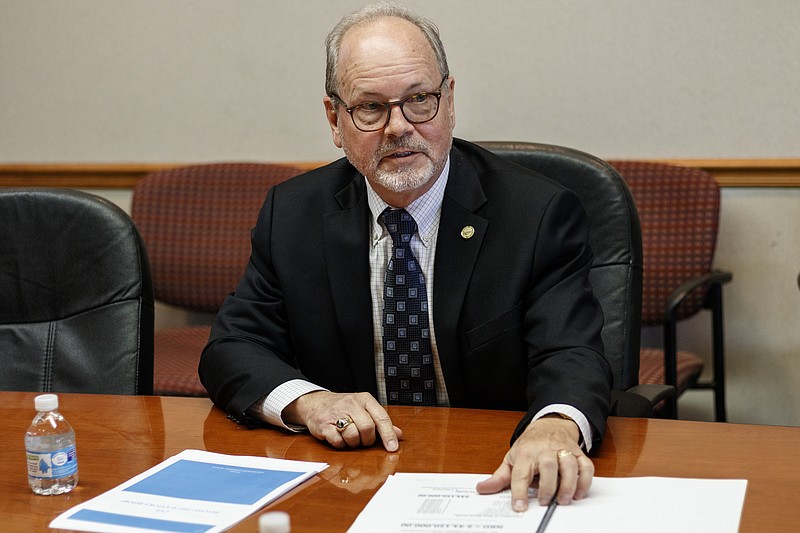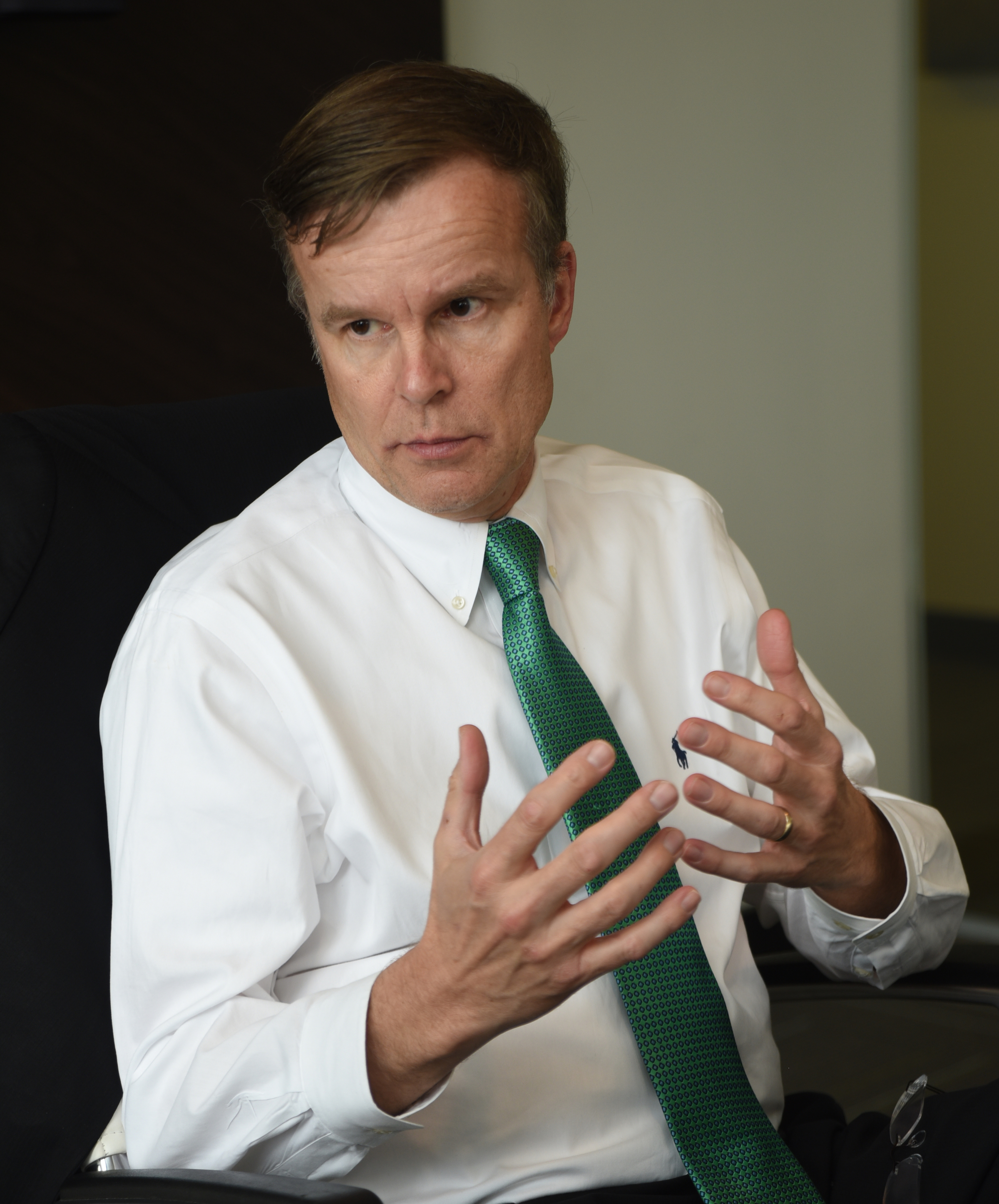The Chattanooga Convention and Visitors Bureau wines and dines business clients at local restaurants as it woos them to choose Chattanooga as the place to hold events.
The "wine" part of those restaurant meals could go away if Hamilton County commissioners decide today to approve a resolution by County Commissioner Tim Boyd.
It would require all nonprofit agencies that receive more than 25 percent of their annual operating budget from Hamilton County to adopt county travel and purchasing policies, to provide all financial documents and records of expenses, and to place a county commissioner on their governing boards.
"In Hamilton County policies, there's no reimbursement for liquor," Boyd said. "It wouldn't affect any of [the CVB's] travel, except they would come under more scrutiny. Instead of the Hilton, every time, [CVB employees] may be staying at the Holiday Inn Express."
The resolution is Boyd's most recent effort to rein in what he calls "out of control" spending by the Convention and Visitors Bureau, which gets around 87 percent of its annual budget from county hotel-motel bed tax - estimated to reach $8.2 million this fiscal year.
"With the amount of monies that they're getting, they need to be under Hamilton County policies, period," Boyd said.
Meanwhile, bureau President Bob Doak opposes every part of Boyd's resolution.
"We do have controls in place for spending, travel, credit cards," Doak said. "We have an independent, third-party audit every single year."
The CVB was founded in the 1960s by people in the travel and tourism industry, he said, not by government.
"There would be no reason for a county commissioner to have a seat on the CVB board," Doak said. "It was not set up as a governmental body or to have government involved in it."
The CVB doesn't rely much on alcohol to woo clients, he said, though it will buy drinks at dinner.
"If they want a drink, we will purchase a drink - up to two. And that happens very rarely," Doak said. "I am a teetotaler. The CVB does not purchase alcohol for a routine event."
Boyd says the CVB overspends on meals, hotels and travel.
He says Convention and Visitors Bureau employees picked up the tab for about $43,400 worth of Chattanooga restaurant meals during the 2014 fiscal year, including $6,641 at Big River Grille, $5,468 at Hennen's and $2,089 at St. John's, according to an unofficial internal document that Boyd said he got from a former employee of the Hamilton County Auditing Department.
"This document was the reason I began my review of the CVB back in February," Boyd said.
Four-star hotels visited by bureau officials then included Loews Ventana Canyon Resort, in Tucson, Ariz., which bills itself as a "luxury oasis." The CVB spent $2,652 there to lodge three employees for training on new computer software.
All told, bureau staff spent $289,589 on travel that fiscal year, Boyd said in reference to a spreadsheet of travel expenses he compiled. The bureau employee who spent the most racked up $53,348 on travel, said Boyd - almost as much as the employee's annual salary of $59,300.
Doak said Boyd's travel figures are wrong, and the total spent was $95,534 for the 2014 fiscal year. He said that Convention and Visitors Bureau employees routinely stay in the same hotel as everyone else during an event for a large group, such as the computer training at the Tucson resort.
"When you're traveling, most of the time, you're at a convention and you stay where the convention is being held," Doak said. "That is a very customary practice at any business."
Doak also defended the bureau's meals out.
"I would say the amount of business and the amount of growth we have seen as a result of these business [meals] has been exponentially higher than the cost," he said.
Doak said the tourism bureau has $945,851 - almost $1 million - budgeted for the next fiscal year so it can write checks directly to events to woo them here.
CVB officials say they don't like having to pay to bring business here - but if they don't, another city will.
Tourism has a $1 billion economic impact in the Chattanooga region, and CVB officials tout that seven-digit figure as justification for their spending. Don't nickel-and-dime us, they argue, when we get a return on investment of $1 billion for only $8 million in spending.
"The estimated economic impact of those events that we're spending $945,851 on is $92 million," Doak said. "So it's nearly 100-1."
But other regions near Chattanooga meet, or surpass, the $1 billion mark for tourism's economic impact - and report a bigger bang for the buck from their tourism bureaus.
The Huntsville, Ala., area, for example, has a $1 billion tourism business, while the Huntsville/Madison County Convention and Visitors Bureau has a budget of $2.4 million.
"We're at $1 billion as far as the economic impact of tourism," said Charles Winters, executive vice president of the Huntsville/Madison County CVB.
In Tennessee, Memphis gets $3 billion in tourist dollars for $9.4 million in spending; Nashville claims $5 billion in tourist spending with a budget of more than $20 million; and Knoxville has around $1 billion in tourist spending, with a visitors bureau budget of about $4 million.
Doak said such comparisons need to be made with care.
"Many times you're not comparing the same, apples and oranges," he said. "Just to look at a CVB budget in a vacuum may not paint a complete picture. Also, other cities have built-in drivers or built-in attractors. For the Daytona 500 race, I don't think Daytona Beach has to do a lot of advertising to get people down there."
The bureau here gets 100 percent of the county's hotel-motel tax, and Boyd has suggested at least $2 million of that should be diverted to a $10 million athletic complex at Howard High School.
"One hundred percent of these funds do not have to go to CVB," he said. "I think [other CVBs] get a lot more bang for their buck."
Contact staff writer Tim Omarzu at tomarzu@timesfreepress.com or www.facebook.com/MeetsForBusiness or on Twitter @meetforbusiness or 423-757-6651.

